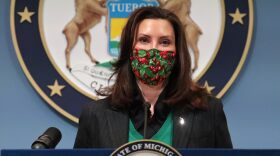Gov. Gretchen Whitmer sought “common ground” with the Republican-led Legislature in her State of the State address Wednesday, calling for quick passage of a multibillion-dollar relief plan that would prioritize coronavirus vaccinations and additional aid to Michigan schools and businesses to end the pandemic.
The spending proposal, first announced last week, was among several policy initiatives outlined in the Democrat’s third annual speech — a virtual one in which she touted residents’ grit in a crisis that has claimed thousands of lives.
“The state of our state is resilience,” the governor said.
The address came hours after GOP lawmakers stepped up opposition to her administration’s COVID-19 restrictions — which have been loosened gradually — sending a message by rejecting 13 of Whitmer’s appointees and saying the funding should not be approved unless she cedes her administration’s power to prohibit in-person instruction and sports to local health departments.
“While common ground seems less and less common these days, it’s never been more important that we work toward it,” Whitmer said. “I know you’re used to me saying ‘fix the damn roads.’ This year, let’s also fix the damn road ahead — find common ground to grow our economy and get families and businesses back on their feet. That starts by ending the pandemic.”
The virus, which has resulted in 600,000-plus cases in Michigan and contributed to the deaths of more than 15,300 residents in 10 months, continues to dominate the governor’s attention. She delivered the 30-minute speech virtually from her office inside the Capitol rather than in person to protect hundreds of legislators and dignitaries who typically would gather in a packed House chamber.
Though a majority of the public has backed her handling of the pandemic, she has faced GOP criticism, a lawsuit and protests — egged on by then-President Donald Trump — over restrictions such as a mask mandate and indoor restaurant dining bans. The speech occurred the same day one of six men accused of plotting to kidnap her last week pleaded guilty. The FBI has said the anti-government extremists were upset over her coronavirus restrictions.
Whitmer said the lockdown and other steps saved lives, but she acknowledged the toll on small businesses and asked the Legislature to help enact the next round of pandemic aid. Her latest proposal would spend $575 million in state funds along with $5 billion in federal relief authorized before Trump left office.
The state funding would include $300 million to help K-12 schools offer face-to-face instruction and $225 million for three new economic-development programs, including grants to restaurants and other “placed-based” businesses hurt by the outbreak.
Republican legislators do not necessarily oppose such spending, having backed grants to workers and businesses as recently as December. But they want input on COVID-19 restrictions before authorizing additional aid and say the governor’s approach has been unilateral and not bipartisan.
Whitmer said her administration this year will aggressively focus on economic growth and getting people back to work. She asked the Legislature to renew tax incentives to support large-scale business expansions. The Good Jobs for Michigan program expired in 2019 after two years.
She also returned to a pre-pandemic priority that she pledged to address while campaigning for governor: fixing the roads and other infrastructure. At last year’s State of the State, she announced that Michigan would borrow $3.5 billion to rebuild the state’s deteriorating highways and bridges over five years after her proposed 45-cents-a-gallon fuel tax hike was rejected. The bonding is not being used to repair local roads.
Michigan is one of few states with a restrictive local road-funding structure, according to the governor’s office. Legislation that would have let counties seek voter approval of local gas taxes and registration fees died last term. It should be passed, Whitmer said, so local communities “can move some dirt, too.”


